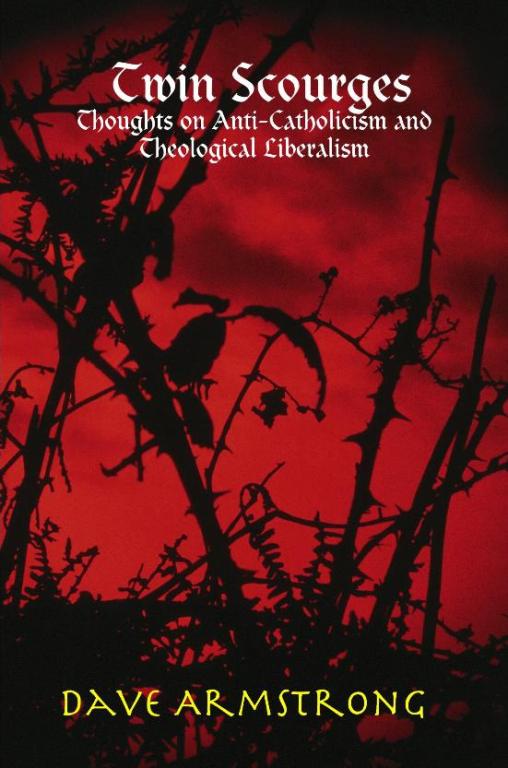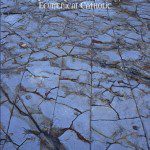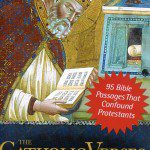(completed in June 2003; published by Lulu in September 2007)
*
—– To purchase, go to the bottom of the page —–
[Lulu cover design by Dave Armstrong]
Table of Contents
Dedication
Foreword (James Cardinal Gibbons)
Introduction
I General Observations
II Martin Luther
III Is All Opposition to Catholicism “Anti-Catholicism”?
IV Protestantism is Christian and Catholicism is Not?
V The Gospel and Faith and Works
VI “Debates” and “Dialogues” with Anti-Catholics
VII Does the Term Anti-Catholic Involve a Double Standard?
VIII Towards a Psychology of Anti-Catholicism
IX Anti-Sacramentalism
X Heterodox Catholics and Liberal Protestants
XI Nominal, Ignorant, and Sinful Catholics
XII Practical Problems Due to the Modernist Crisis
Appendix One Martin Luther’s Anti-Catholic Statements
Appendix Two G.K. Chesterton on Anti-Catholicism
Appendix Three John Henry Cardinal Newman on Anti-Catholicism
Appendix Four Use of the Term Anti-Catholicism in
Non-Catholic Scholarly Circles
Appendix Five John Henry Cardinal Newman on
Theological Liberalism
Appendix Six Catholic Encyclopedia (1913): Modernism
Introduction
I shall follow in this book the numbered structural format of the classic work by the French mathematician, physicist, and Catholic apologist Blaise Pascal, Pensees (“thoughts” – 1662). My intention is to highlight general and particular characteristics of these theological aberrations, in the manner of “sayings” – a literary technique used to great effect by our Lord Jesus Christ, St. Francis of Assisi, Confucius, and Socrates, among many others.
In so doing I hope to introduce readers to the basic, underlying tenets and the false, misleading “spirit” which are part and parcel of both anti-Catholicism and theological liberalism, by means of “ponderings” or “reflections” or “proverbs” (generalizations which express broad truths – not intended as applying in absolutely every instance); as opposed to an exhaustive treatise and refutation of persons and their arguments.
I’m only interested in critiquing the erroneous ideas and educating and equipping readers to think critically about the important issues at stake, so that they can in turn (it is to be devoutly hoped) go out and do the work of re-education that must occur among thousands who are caught up in (or adversely affected by) these tremendously harmful false beliefs.
It will be helpful to offer brief definitions of my subject matter. I accept the commonly-used definition of anti-Catholicism as the position which maintains that the Catholic Church is not Christian, or that the system of Catholic theology is not a Christian set of beliefs. Catholicism is regarded as non-Christian, or sub-Christian, or grossly heretical: a dangerous, deceptive counterfeit of true, genuine Christianity.
I am happy to report that anti-Catholicism is a small minority position amongst Protestants and Eastern Orthodox; yet it remains an influential and vocal one. Not all (or even many) Protestants or Orthodox are anti-Catholic, by any stretch of the imagination. Nor is mere critique of or disagreement with Catholic dogmas and beliefs automatically to be deemed anti-Catholic. One must deny the Christian status of Catholicism.
The essential error and sin of anti-Catholicism is, therefore, the outrageous falsehood involved in denying that a Christian group is Christian. It is bearing false witness, and slandering (whether maliciously or not) one’s brothers in Christ. I have argued in many of my writings that a denial of the Christian status of the Catholic Church while claiming to be a Christian apart from it, involves one in certain self-defeating and fatal propositions which cannot be sustained for a moment in light of the history of Christianity. But that is beyond my immediate purview.
I don’t deny, of course, that anyone who is a trinitarian and who adheres to the Nicene Creed is (doctrinally) a Christian (that is basically the official Catholic position on other Christians), but I contend that for them to claim “exclusivity” to the title of Christian while denying it to the largest, most historically and theologically influential Christian group, is absurd and ludicrous, on many grounds.
Some of the common or recurring motifs of anti-Catholicism are charges of Mariolatry, idolatry (of statues – iconoclasm – and the consecrated host, particularly), Semi-Pelagianism and a “religion of works,” denigration of the Bible and pervasive “unbiblical” notions, undue influence of paganism, “unbiblical” sacramentalism and sacerdotalism, undue emphasis on Tradition and Church authority (above all, the pope, of course), and various conspiratorial theories involving the so-called “Whore of Babylon,” the pope-as-antichrist, the one-world heretical and apostate religion, and so forth.
Often corresponding to these “hostile” beliefs are various prejudices and misinformed rhetoric and propaganda which derive from a continuous tradition, passed down in certain circles and taken in by members of anti-Catholic groups almost as if by osmosis, without very much reflection or consultation of the other “side” which is being berated and condemned.
By theological liberalism I mean the various versions of ostensibly or vaguely Christian teaching which depart from historic Christian orthodoxy, as defined in Councils, Creeds, and Confessions down through history. Christians of all stripes agree on many things with regard to theology. Perhaps the most common criteria of “orthodoxy” in a larger Christian sense would be the Nicene Creed. As a Catholic, of course I would adhere to the orthodoxy defined by the Catholic Church and the popes. But I will not always necessarily treat liberalism in that narrower sense in this book.
C. S. Lewis stated that those in the center of their Christian traditions (that it, the orthodox) have much more in common with each other than with the liberals in their own communions. How true that is! Thus, in many ways, my orthodox Protestant brethren will be able to agree with and relate to my criticism of liberalism, because they, too, are burdened with the problem. Liberalism is the “scourge” of all who profess to adhere to the orthodox understanding of the theology of their own Christian tradition.
Theological liberalism involves many fallacies, double standards, and arbitrary distinctions which shall be treated in the book. At bottom, one might say that it is characterized by a lack of faith and belief. Once one picks and chooses what they want to believe in Christianity on ultimately arbitrary grounds other than the Bible, Tradition, and the teaching that has been preserved and passed down from the apostles, then a loss of supernatural faith occurs and the person has, in effect, made themselves the Judge of things which they have no business judging.
Christianity (by definition) requires revelation, faith, and the miraculous. If any of these aspects are attacked or disbelieved, then liberalism and the spirit of heterodoxy or heresy or modernism or dissent are present. Yet most such persons continue on in the Christian community after they have ceased believing in various Christian beliefs, either not being aware of it (lack of education) or knowing full well that their belief has shifted, but assuming that it doesn’t matter, and that they are just as just as orthodox as any other Christian (obstinacy, intellectual dishonesty and rebellion within the fold). This poses many sociological and pastoral difficulties for Christian groups.
May God help those in both parties (and adherence of other such false or heretical notions) to be made aware of the seriousness of their error, to repent, and to regain a robust supernatural faith and renewed devotion as a disciple of Jesus.
Excerpts
10. The usual, scholarly Catholic definition of anti-Catholic has nothing to do with emotionalism or hostility or arrogance at all; it is a doctrinal or theological definition, not a personal or emotional one. But it must be noted that those other things more often than not accompany the anti-Catholic theological beliefs, in practice.
48. Anti-Catholic is a legitimate term. It shouldn’t be used as a club to the exclusion of talking, or wielded by those who have a persecution complex, or to dismiss all criticism of Catholicism whatever, to the exclusion of intelligent discourse, but the term itself is entirely proper, which is why non-Catholic scholars (particularly sociologists and Church historians) use it all the time. This is what a lot of people hung up on refuting the Catholic Church don’t seem to get.
51. By the criteria of anti-Catholic Protestant critics of Catholicism, a Catholic can only be a “real” Christian insofar as (in direct proportion to) they reject those tenets of Catholicism which Protestantism rejects, or show an interest in things Protestants stress (for example, if they read the Bible a lot and talk about being “saved,” and show skepticism towards “all that weird Mary and the saints stuff,” etc., chances are they are “in”). This is, of course, an extreme insult to any self-respecting, devout, faithful Catholic. Catholicism is either Christian or not. If it is, then a Catholic who believes every jot and tittle of Catholicism (as all Catholics are required to do by the nature of the system) are Christians, in the sense I have described, just like any orthodox Presbyterian or Methodist or Lutheran or member of the Assemblies of God is a Christian. One can quibble about the differences, but the core which binds us all is there.
94. The title anti-Catholic is not intended to refer to emotions or bigotry or hatred; it is strictly a descriptive – virtually sociological – title for one who opposes the Catholic Church-as-Christian. It means “anti-Catholic (Church),” not “anti-Catholic (persons)” in the sense of personal animus, as in “anti-Semitism.” Catholics use it in the sense of:anti-abortion
anti-lock brake system
anti-theft device
anti-Communist
anti-disestablishmentarianism
anti-trust
anti-aircraft missiles
anti-bacterial medicine
anti-climax
anti-depressant
anti-oxidant
anti-slavery
anti-histamine
In this same exact sense I would describe myself as “anti-Mormon” or “anti-Jehovah’s Witnesses.” I have indeed referred to myself as a “counter-cult researcher” for many years. A synonym for that might be “anti-cult researcher.” I am “anti-heretical.” I do not regard these groups as Christian (I think they claim the title falsely). Anti-Catholics do not regard the Catholic Church as a Christian institution.
113. When one views a scenario (in this case, Catholic vs. Protestant apologetics battles) as “war” – with the stakes the very highest that they can be (hell vs. heaven; damnation vs. salvation; light vs. darkness; God vs. Satan), then one behaves like a warrior and a soldier. Thus, the anti-Catholic sees Catholics not as Christian brothers, but as the “enemy” – in spiritual darkness; outside the “gates” – and enemies are dealt with in a constant attitude of mistrust, cynicism, derision, and either outright hatred or at least intense hostility.
123. Catholics have “the books,” the dogmas, the decrees, the councils, the current Catechism, the uniform, developed doctrinal history and Tradition. Everyone knows what the Catholic Church believes on any major topic. But if dissenters can’t bring themselves to be honest with themselves and accept that this is what their Church holds, how is that a disproof of the oneness of Catholicism? It is none at all. They are simply straying sheep, heretical in spirit (to varying degrees). We can say they are not Catholic theologians if we so choose. But Protestants can only fight, disagree, and form a new sect when (inevitably) no resolution can be achieved. Is this not obvious?
191. Many Protestants (especially evangelicals) play the “ignorance card” sooner or later, in discussions of comparative religion, or polemical and “controversial” endeavors. It is an approach which is quite familiar to Catholic apologists. The question is fair enough, I suppose, and has some weight prima facie. I believe, however, that this argument is fallacious, because there is no direct correlation between a religious body being doctrinally correct and the level of instruction and fidelity of its members. Ignorance, nominalism and heterodoxy can be due to many factors, none of which prove the theological falsehood of any given group. We can only judge by “the books” of a religious body, in order to objectively and accurately evaluate its truth claims.
Purchase Options******
Last updated on 3 June 2023














